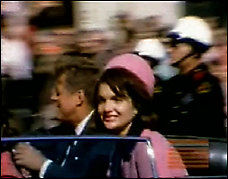“Skeptics derided JFK, as they now do Obama, as callow and ill-versed in substantive issues. And yet Obama, similar to JFK, manages to inspire people with sex appeal, cerebral cool, and a message of generational change.” Rutgers University professor David Greenberg examines the similarities between Senator Obama and President Kennedy, and argues that Obama’s team might just be taking a page from the JFK campaign’s Catholicism playbook with regard to race in 2008. “Having passed a threshold among most white voters, his race can implicitly encourage them to feel that a vote for Obama is a vote for tolerance, for a future free of the constricting prejudices of the past, and for a sense of hope that Jack Kennedy once evoked.“
Tag: John F. Kennedy
And, smiling, Jackie’s driving by.
Unearthed from the collection of amateur photographer George Jefferies, a new 8mm film of Kennedy in Dallas comes to light. “The silent, 8 mm color film is ‘the clearest, best film of Jackie in the motorcade,’ said Gary Mack, curator of the Sixth Floor Museum, which focuses on Kennedy’s life and assassination.” Also, via Ted, Case Closed author Gerald Posner parses the footage.
So Help Me God.
As the Bushies warm up the teleprompter, the Washington Post attempts to explain why most inaugural addresses are boring, Chris Suellentrop surveys some of the lousier efforts over the years (with help from this Library of Congress exhibit), and David Greenberg looks back at the last great one (Kennedy, 1961). Somehow, I have a sneaking suspicion that Dubya’s evocation tomorrow of “The Ownership Society” isn’t going to make the A-list.
Back to the Grassy Knoll.
Forty years after publication of the Warren Report, Salon editor-in-chief David Talbot makes the case (again) for a conspiracy that felled Kennedy. A somewhat shrill and Oliver-Stone-like piece, to be sure, but, if nothing else, Talbot has amassed a few quotes from doubters in high places — RFK, LBJ, Nixon — that I hadn’t seen before.
Sympathy for the Devils.
 The mystery of the grassy knoll has finally been solved, and the second shooter was…John Wilkes Booth?! For the first time in an age, I took advantage of the New York theater scene last night and caught the much-heralded revival of Stephen Sondheim’s Assassins at the Roundabout Theatre, which chronicles the inner demons of Mssrs. Booth, Oswald, Hinckley, and assorted other murderers and would-be-murderers of presidents. All in all, I’d say I enjoyed it, although it took a musical number or two for me to warm to the material (some never made the leap — the guy next to me left outraged.) And there’s some memorable performances here, particularly Denis O’Hare as Charles Guiteau (Garfield’s assassin) and Michael Cerveris as Booth.
The mystery of the grassy knoll has finally been solved, and the second shooter was…John Wilkes Booth?! For the first time in an age, I took advantage of the New York theater scene last night and caught the much-heralded revival of Stephen Sondheim’s Assassins at the Roundabout Theatre, which chronicles the inner demons of Mssrs. Booth, Oswald, Hinckley, and assorted other murderers and would-be-murderers of presidents. All in all, I’d say I enjoyed it, although it took a musical number or two for me to warm to the material (some never made the leap — the guy next to me left outraged.) And there’s some memorable performances here, particularly Denis O’Hare as Charles Guiteau (Garfield’s assassin) and Michael Cerveris as Booth.
Still, the basic (and ahistorical) message of the play — that all assassins, whatever their surface motives, are just looking for a little happiness, a little love, and a little fame — was encapsulated much more succinctly by Peter Gabriel’s excellent “Family Snapshot” two decades ago. And, while I like that song and admire what this play was trying to be, this “everybody needs a hug” thesis is too reductively simplistic. Notwithstanding freak shows like Hinckley, assassination is by its very definition a political act, as is distressingly obvious to all of us given recent events in the Middle East. Sure, a lot of assassins are flat-out crazies…Hinckley, Mark David Chapman, Sirhan Sirhan. But others — Booth, Guiteau, Leon “McKinley” Czolgosz, James Earl Ray, Brutus — had a political agenda in mind that can’t be explained solely by “bad reviews” or a lack of affection as a child (which is perhaps why the Sondheim play ignores the Stalwart v. Halfbreed internecine strife propelling Guiteau to his foul deed.)

Defending Camelot.
In his most recent “History Lesson,” Slate‘s David Greenberg explodes the conservative myth of JFK as the original supply-sider.
11.22.63.
The Fall of Camelot.
With the forty-year anniversary of JFK’s assassination tomorrow, former White House correspondent Tom Wicker assesses Kennedy’s place in history, Sean Wilentz examines his civil rights record, and David Greenberg refutes the Dallas-Watergate connection.
Camelot Crusade?
Fred Kaplan of Slate reexamines the lingering question of Kennedy and Vietnam in light of Robert Dallek’s new biography.
Pulling back the Curtain.
Meant to blog this a few days ago but didn’t. Boston University historian Robert Dallek discusses new information on JFK’s health in the Atlantic. As with FDR, one wonders if Kennedy would have gotten anywhere near the White House with this medical record in our present age.


